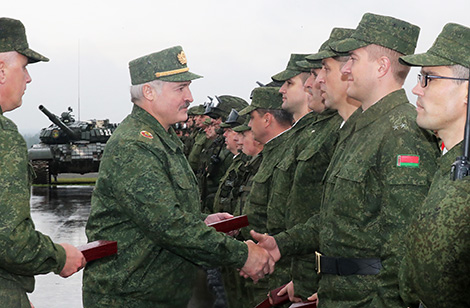
Belarusian forces are not engaging in the operation in Ukraine, according to President Alexander Lukashenko, since they “have nothing to do there” and “are not summoned there.” Belarus, he said, will not “become engaged” in the Russian-led special operation in Ukraine. He believes that the republic does not need to assist Russia. Lukashenko stated that, as part of the current operation, Belarusian forces are carrying out their duties on the country’s territory, preventing an attack from the rear. “Our objective – and this is critical in any encounter, not just war – is to avoid a rear assault on advancing soldiers. Russian. This is something we must never tolerate. Never! It would be akin to betrayal. I mentioned that in the early days. We’re doing it because we still need it as a nation to secure our borders in the northwest, west, and even now in the south,” he stated.
However, Belarusian forces have been placed on high alert many times since February 24, amid persistent accusations that they may join the Russian army’s invasion of Ukraine. Nonetheless, the Belarusian military has not yet participated directly in the conflict with Ukraine. On May 5, Belarus’ de facto President, Alexander Lukashenko, stated that he did not anticipate the war in Ukraine to “take that long.” On May 10, the General Staff of the Belarusian Armed Forces abruptly announced the reinforcement of soldiers in border areas in response to “the expansion of the military contingent of Western nations near the Belarusian borders.” Belarusian special troops have been sent to the Ukrainian border. Belarus’ Ministry of Defense recently announced the contact of numerous reserve draftees for national defense training.
It seems that Alexander Lukashenko has been facing a difficult dilemma since the beginning of the Russo-Ukrainian war. He has likely been weighing the urge to assist Russia’s invasion of Ukraine with the need to avoid direct military engagement due to sanctions, a retaliatory strike from Ukraine, and the potential resentment of certain Belarusian military personnel. The Belarussian army has no reason to attack. Defending Lukashenko, who is politically inept, is hardly a motivating factor. Fighting for the interests of the Kremlin’s ruler is also an odd reason for getting a bullet in the arm, leg, or head. An army without motivation is a risk for Lukashenko. Furthermore, it is possible that Lukashenko does not want to get involved in this war because he knows that the outcome would directly undermine his authority. If Russia loses the conflict in Ukraine, Putin’s loss will extend to Lukashenko, who would face the prospect of being incarcerated. That is not a probable scenario, but he takes it into consideration. However, as perplexing as it may appear at first, Moscow’s victory is also dangerous for Belarussian President. In that case, Lukashenko, will be entirely under Putin’s control, and Putin may suddenly come up with the idea of replacing Lukashenko with another, more devoted individual.
So, what are the actual chances of Belarus engaging in the Russo-Ukrainian Conflict? That question requires some analysis of Belarussian leadership system. Compared to Lukashenko, Putin’s logic is easier to understand. When we look at his ratings over the course of his administration, we can see that his rating has always risen during “small victorious wars.” While the internal political reasons for Putin’s conduct are comprehensible, Belarus is not Russia, and neither the leadership nor the people have similar aspirations. As a result, Lukashenko will do all in his power to avoid participating in the war. Whether or not that works depends on how strongly Russia pushes, and how badly Russia needs it. It is important to remember that while Lukashenko may be useful in improving ties with the West, Belarus provides little military benefit. It is true that Lukashenko gave Putin Belarus’ land for missile attacks and “invasion trampoline”, but he has yet to send soldiers to assist Russian troops. The conflict has been going on for several months, therefore the chance of Lukashenko making such a move is quite low. It is also worth noting that Belarussian President never acknowledged the self-proclaimed “LNR” and “DNR.” Of course, it can be argued that was Kremlin’s plan all along, and that Lukashenko should not have recognized the disputed territories.
Lukashenko is politically and economically dependent on the Kremlin, and he will do anything Putin says. If Putin needs to launch a military operation from Belarusian soil, Lukashenko will be forced to cooperate. Lukashenko is an illegitimate leader. Generally, when people do not support their leader, he has to make sacrifices in exchange for some support. In exchange for Putin’s political and military assistance, Lukashenko “sells” the country’s sovereignty to Russia. Accordingly, Lukashenko protects his position by indirect involvement in the war. The question now is will the Belarusian army deploy to Ukraine if Lukashenko gives an order, or if an order is sent to him from Moscow? Various information sources, national surveys, and army attitude suggest that, in general, all Belarusians are highly opposed to their participation in the Russo-Ukrainian conflict. This also applies to the army, and it appears that if Belarusians are sent to Ukraine, they will fight quite poorly. Some will defect to the Ukrainian side, others will join them, but the Belarusian army will not have a strong motivation to fight against Ukrainians.
References
Dickinson, P. (2022, June 8). Belarus Bluff? Putin’s only ally sparks fears of possible new Kyiv offensive. Atlantic Council. Retrieved July 6, 2022, from https://www.atlanticcouncil.org/blogs/belarusalert/belarus-bluff-putins-only-ally-sparks-fears-of-possible-new-kyiv-offensive/
Phillips, I. (2022, May 5). The AP interview: Belarus admits Russia’s war ‘drags on’. AP NEWS. Retrieved July 6, 2022, from https://apnews.com/article/belarus-alexander-lukashenko-ap-interview-9bc1f6524eb65841b924883705684b7f
Shraibman, A. (2022, May 17). Won’t get fooled again: Is Lukashenko trying to distance himself from Russia? Carnegie Endowment for International Peace. Retrieved July 6, 2022, from https://carnegieendowment.org/eurasiainsight/87140
By The European Institute for International Law and International Relations.















